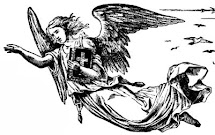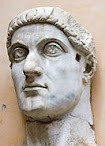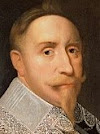Religious Freedom.
[by J. C. W. Lindemann] (Cont'd from Part 1)
Luther was the angel flying through heaven with the "everlasting Gospel" of which John had prophesied in Revelation (14:6-7). His teaching spread rapidly through all European countries, and everywhere it found adherents. In England, Scandinavia, Poland, Hungary, Italy, Spain, Portugal, France, the Netherlands and Switzerland — everywhere there were Lutherans. In Germany, Luther's teachings found acceptance in Würtemberg, Bavaria and Austria as well as in Saxony, Prussia and Brunswick. But in not a few countries Luther's teaching was forcibly suppressed and, if possible, eradicated. The troublesome connection between State and Church gave the welcome inducement, the alleged legal reason, and the means of execution.
Luther had not only not wanted this union [between Church and State]; but he had also often and earnestly testified that between State and Church, between prince and bishop, there was an eternal difference made by God, which no one was allowed to abolish, which no ruler could disregard without doing unspeakable harm to both communities, the political and the ecclesiastical.
But already since Constantine the Great († 337) the Church had become dependent on the State; and since the advent of the Popes, the longer they had ruled the more Church and State. When the Reformation began, the most unfortunate connection between Church and State existed in all Christian countries. Luther also preached the divine truth in this respect and brought about a Reformation; but the Pope and the Emperor, of course, never acknowledged it, and among the "Protestants," on the one hand imperiousness, on the other hand habit, indifference, and carelessness soon caused the precious and laboriously won treasure to be forgotten again.
There have been few Christian princes, even few Lutheran princes, after the Reformation, who would have said with Gustavus Adolphus, the great King of Sweden († 1632): "In the State every one is correct who lives according to the laws; to save men from hell is the business of preachers, and not of kings!" Most princes, Catholic, Lutheran, Reformed, United, have more or less acted as "chief bishops" of their country, and have sometimes acted more leniently, sometimes more cruelly, according to the principle: The religion which the prince recognizes as the "true" one must also be accepted by the subjects. Those of other faiths can at best only be tolerated.
It is impossible to say what misery this politically unwise as well as morally ungodly principle has brought upon the members of the state and the church. Nothing better could the devil have devised to torment men on earth than this rule: "Whose sovereignty is the country's, his [religion] is also the country's religion." According to this rule, in incomprehensible blindness, not only Catholic, but also, God be lamented, so-called Protestant and Lutheran princes have acted, and have thus brought misery upon their subjects, which no man can comprehend and describe. The clear Word of the Lord, "My kingdom is not of this world" (John 18:36), was not to be respected and understood, but the church was to be governed as soldiers are commanded, and consciences were to be forced and judged as hands and feet are used for outward purposes. Vain destruction has resulted from this, so far as the intention and doings of the oppressors are considered.
We need to look around a bit in each country to see the truth of what is being claimed.
 |
| Ferdinand I – Maximilian II Camerarius – David Chrytaeus Heilbrunner – Polykarp Leyser Joh. Seb. Pfauser – Jan Blahoslav |
In Austria, in the hereditary lands of the Habsburg imperial house, Luther's teachings had found many followers among high and low. Even Ferdinand I (1554- 64) is said to have been no more unfavorable to it in the last years of his life than he had been formerly. His son Maximilian II. (1564-76) proved to be her open friend and protector. 2) He wanted to grant the higher estates in the Archduchy of Austria free exercise of religion; he only demanded that they should order their church system. He himself appointed the Leipzig theologian Camerarius for this purpose. The Protestant estates, however, appointed a pupil of Melanchthon from Rostock, David Chyträus, who in 1566 drew up a church agenda for them, most of which was approved by the Emperor himself. Now he granted them complete religious freedom in Upper and Lower Austria and the seven provincial cities (1568), and Lutheran preachers were called there from other parts of Germany; for example, from Würtemberg M. Georg Schrecksmelius, M. Jacob Heilbrunner, M. Polykarpus Leyser, M. Georg Trigel, M. Thomas Otto and Moses Pflacher. Even in Vienna a Lutheran church was now built, in which thousands heard the pure Gospel; and many smaller towns, castles, and villages were exclusively devoted to Lutheran doctrine. Maximilian knew how far by divine right his imperial power extended; he used to say, "I have no power over consciences, and may force no one to believe.” 3)
2) The court preacher of Emperor Ferdinand, Joh. Seb. Pfauser, was, without him knowing it, himself attached to the Protestant doctrine and taught his pupil Maximilian Protestant principles. When the Emperor finally learned of this, he hurried into Pfauser's room, showered him with reproaches for misleading his son, seized him by the collar, drew his sword, and could hardly refrain from using it. However, he got hold of himself and ordered the court preacher to be removed. — Thus Pfauser himself related this incident to the senior of the Moravian brethren, Joh. Blahoslaw. (Pescheck 1, 99.)
3) Against the Bishop of Olomouc he once said: "It is too much to want to rule over consciences. He who wants to force consciences seems to me like one who is thankful to storm heaven." (Pescheck I, 100.)





No comments:
Post a Comment
Comments only accepted when directly related to the post.